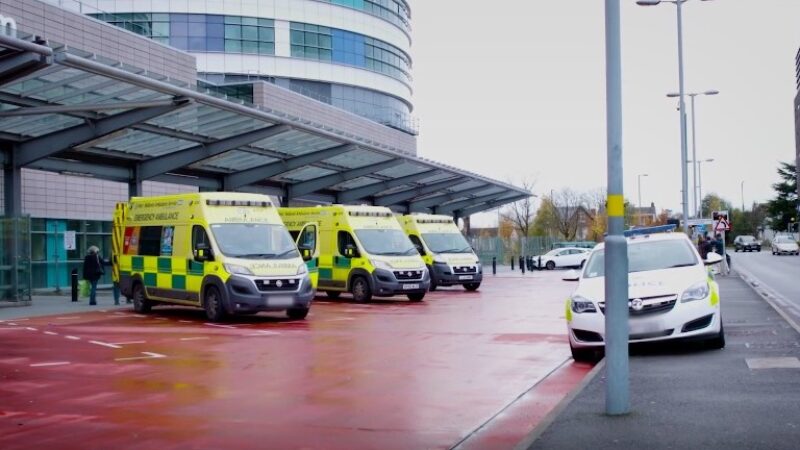
Earlier this month, Roy Clare, an 89-year old from Southend, suffered a suspected stroke and fell out of his wheelchair, cutting his head open. On calling 999, his daughter was told to expect a 21-hour wait time for an ambulance. Eventually, Roy was attended to but had to wait outside Southend Hospital A&E for eight hours in an ambulance. This should be a shocking aberration. But it isn’t. Analysis by the Royal College of Emergency Medicine has shown that more than 4,500 deaths in England in 2020-21 can be attributed to A&E delays and overcrowding.
The fact that we find ourselves in 2022 in ‘backlog Britain’ should be a national outrage. A serious government of the day – the government of a nation that spends around half of all GDP on public services – should be focusing political attention on cancer waiting times, court hearing delays, housing placement waits and passport queues. Instead, it is picking fights with the Church, the United Nations and proponents of the metric system.
Prime Ministers come and go, but public services are permanent. Public services may not sound sexy, but they matter enormously to citizens. Health and education have consistently polled as two of the most important issues facing the country. To win back power, Labour must of course win the argument on who will deliver economic growth amidst the cost-of-living crisis. But it must also recognise that this involves demonstrating credible leadership of the vast swathes of the economy that constitute public services.
The root causes of backlog Britain can be traced back to 12 years of Conservative mismanagement. An economically illiterate austerity assault, particularly focused on local government, leading to a crisis in social care. A bungled Brexit; we should be making new, expansive trade deals across the globe rather than gearing up for a trade war with the EU. And financial mismanagement during Covid-19, leading to billions wasted in fraud and extra pressure on the public purse.
Articulating the problem is not enough. Labour should put forward a five-point plan for the revival of public services and a path back to power.
- Make the strategy delivery. The magic wand for public service improvement doesn’t need to be rediscovered. It was created when Labour was last in power. Radical improvements were achieved through the combination of political leadership, public service agreements and focused attention on delivery by the Prime Minister’s Delivery Unit. In 2010, only 2.7% of patients had to wait longer than four hours to be seen in A&E. Today, it’s 27%. That’s the difference a relentless focus on delivery makes.
- Focus on the priorities that matter and make the case for investment. Everything being a priority means that nothing is a priority. At this moment, cancer waiting times, educational catch-up, the Crown Courts backlog and passport delays should be the focus. These priorities should iterate as the backlogs reduce. Whilst significant new monies may not be needed – the UK is not an outlier for underspending relative to OECD peers – some will be essential in order to transform and improve services. (Though the figure will almost certainly be less than the £11bn lost on debt interest payments, a loss that the National Institute of Economic and Social Research concluded could have been avoided by Chancellor Rishi Sunak.) Labour should be unafraid to make the case for investment in these priorities and be clear that these are investments which generate a return; monies spent in primary care save money in A&E and surgery further down the line.
- Put technology at the centre. Technology can’t solve everything. But it can help a lot. GP waiting times in England are on average 10 days. Remote consultations and an expanded 111 service – for appropriate concerns – can play a huge role in bringing this down, as the public accounts committee has concluded. Extra educational tuition can be delivered cost effectively thanks to matching platform technologies – an enhanced National Tutoring Programme would help here. Citizens now expect on-demand services. Public services need to keep up, and technology is critical in enabling this.
- Show the difference we can make. Improvements in life expectancy have stalled and then gone backwards since Labour was last in power, including after Covid-19 and wider demographic trends are taken into account. Hospital waiting times are at their highest since records began. Labour’s track record of public service improvement needs to be rediscovered and heralded again.
- Campaign for better. In advance of the next general election, parliamentary candidates should have at their finger tips what local public services’ performance is in their area. For example, in West Yorkshire, from last available figures, more than 19,000 patients waited longer than four hours in A&E in May alone. In the North West, average waiting times for sexual offence trials in the courts were 31 weeks in the last quarter. The message should be: “You deserve better. Under Labour, we’ll sort it out.”
Labour exists to transform lives for the better. Public services are key to doing so.




More from LabourList
SPONSORED: ‘Industrial hemp and the challenge of turning Labour’s priorities into practice’
‘A day is a long time in politics, so we need ‘action this day’’
Strong support for child social media ban among Labour members, poll reveals